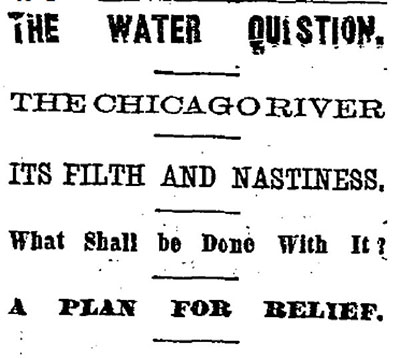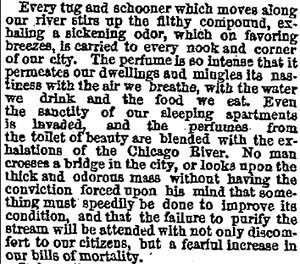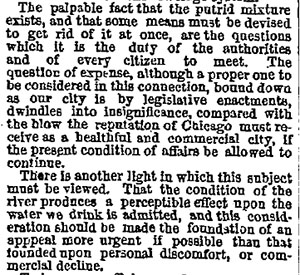1859 Annual Report of the Board of Public Works, report of Ellis S. Chesbrough, Chief Engineer of the Sewerage Board:
The large, white-looking animalcules, which were so abundant in the lake water a short time since, a species of Cyclops, are found in the Cochitual water supplied to Boston, which the table already given shows to be as pure as that of any large city in the country. They are also found in the water supplied to London by the New River Company, which furnishes more than any other to that city.
The smoky or kreosote taste, which was so disagreeable for about three days, the early part of this month, occurred once before, for a shorter time, this winter. It has also been noticed several winters previous to this. The circumstances under which it has always occurred appear to be uniform. They are, rain and thaw, on a surface for some time previously covered with ice and snow. The snow and ice become highly impregnated with smoke, and when thawed, are, to a considerable extent, washed into the lake in the vicinity of the pumping works.
1862 Annual Report of the Board of Public Works:
p. 5 Impure State of the Water: The recent complaints of our citizens in relation to the impurity of the water at this time, have arisen from causes wholly beyond our control. The small fish of which complaint has been made are indeed a source of annoyance, but they can be guarded against by a small expenditure, arrangements for which will be completed in the Spring. But the prime cause of every serious complaint arises, in our opinion, (based upon careful examination), from the large quantities of blood and other waste and foul substances that find their way into the river from the many slaughtering and rendering establishments, distilleries and other works of a like nature, which, as all are aware, have increased to such an extent within a few years, as to render it necessary that proper steps be taken to prevent the yearly recurrence of the same difficulty.
The extension of the inlet pipe a mile further out into the lake would probably protect our citizens against the frequent repetition of this great nuisance; yet we are not confident that the remedy would be complete, for the reason that at certain periods the muddy and impure water of the river extends even beyond that distance from the lakeshore – although the impurity never could be as great as we now occasionally find it in the vicinity of our present inlet pipe. The cost of such extension would probably be from one hundred thousand to one hundred and twenty-five thousand dollars.
Admitting that this expenditure would improve the water for the time being, and also in the future, and that the present trouble arising from the causes stated above is thus remedied, the great evil still remains – to exhale its noxious vapors, and to endanger the health of our citizens. We cannot believe that it will long be suffered to exist, even if the inlet pipe shall be extended as suggested, and when this nuisance shall be removed, there will be no longer a necessity for extending an inlet pipe thus far.
There still remains sufficient doubts as to the feasibility of extending an iron pipe five feet in diameter so far out into the lake, to demand the most careful consideration before engaging in an enterprise requiring so large an outlay of money. The Board have no examples before them that afford proof of success, and it is believed that the experiment would be entirely novel – of laying a pipe of the required size so great in the distance, where it must encounter the strength and violence of so large and boisterous a body of water as Lake Michigan.
p.32: Basin in the Lake. This is gradually filling up with sand; and the breakwater around it shows more and more signs of decay. Much annoyance has been experienced during severe storms, by the washing of hops and other refuse from the brewery south of the pumping works in the Basin. It is exceedingly desirable that whatever rights the owners of the brewery in question may have to deposit or retain offensive substances in such close proximity to the pumping works, should in some way be extinguished.
p. 38: Quality of the water. With the exception of turbidness during and shortly after easterly storms, the quality of the water furnished has generally been very good; but there have been occasional exceptions, the most important of which are owing to three different causes.
First, after a long continuance of snow and ice, a thaw and rain are sure to be followed by an unpleasant smoky taste in the water, lasting from one to two days. This happens seldom more than twice in a winter, and sometimes not more than once.
Second, the “fish nuisance,” as it has generally been called. This has never been so annoying before as it has been this winter. In December they came in such quantities as to choke up the only screen that was effectual in keeping them out of the pumping well, and in order to prevent the pumps from sucking air instead of water, it was found necessary to remove this screen, which being in the grooves intended for a stop gate, could not be cleaned without being taken out, and the very act of taking it out necessarily let all the fish accumulated above it pass through. It was hoped and believed, judging from the experience of previous winters, that the trouble would cease in a shorter time than any thing effectual could be done in at the entrance of the inlet pipe. At this point three screens had been put in , with conveniences for taking one out at t time to be cleaned, whole the others stopped the passage of fish or other substances. But the bottoms of these screens had been undermined, and the protection to the inlet supposed to be otherwise so much injured by the ice, as to render any attempt at effectual repairs hopeless. But as the nuisance continued, and caused the hot water from boilers connected with the works to be peculiarly offensive, and sometimes causing even the cold water to taste, to say nothing of the offensive sight of so many dead and mangled fish coming from the taps in nearly every part of the city, an attempt was made to close up the openings under the screens by means of stones, gravel and canvas; first building a shanty over the screens to shelter the laborers. … After we had begun go congratulate ourselves upon the purity of the water, and that the fish would not trouble us again this season, they re-appeared suddenly, through previously undiscovered openings, in great multitudes, and made it necessary to take out the screen near the engine house. …
Third, the most serious cause of impurity is believed to be the river. There have been several occasions during the last three years when many persons thought they could perceive the effect of the river in the taste of the water, but not until the night of the 10th inst., and during several days since, did that effect become so striking as to convince all who have examined into it of its real nature. On the morning of the 10th, the wind being from the south and westward, the Lake fell to an unusually low point. This, of course, caused a very large amount of water to be discharged from the river into the Lake, producing the well known disagreeable effect upon its taste and smell, so that it could be distinctly perceived along the shore, from a considerable distance south of the river, to the cemetery on the north.
… But while the sewers have undoubtedly had their share – and a very important one too – in corrupting the river, another cause, which did not in 1855, if it does no, legally exist, has tended most powerful to produce the present state of things; and that is the wholesale discharge of blood, and other refuse from the slaughter and packing houses, in and around the city, besides distilleries, glue factories, establishments for rendering offal, &c.
p.44 In concluding this article on the quality of the water, what has been said may be thus summed up:
1st, The smoky taste occurs so seldom as not to be a serious matter.
2nd, The fish nuisance can and no doubt will be entirely prevented before next winter.
3rd, The very disagreeable taste and smell occurring at three different times during the last two weeks, and lasting two to three days each time, evidently proceeded from the river.
4th, The offensive state of the river this winter, is due very largely to the great quantity of blood and other refuse discharged into it from packing houses, distilleries, &c.
5th, Pumping at Bridgeport would bring the speediest, and would be the most economical temporary relief.
6th, It is exceedingly desirable to postpone the adoption of a very expensive permanent plans a few years till more light can be obtained on the several questions before mentioned.
7th, The analysis shows, what was known to chemists before, that an offensive taste and smell in the water, is owing not so much to the quantity of organic matter present, as it is to its condition of life or decay.
8th, Natural relief may be expected soon from the thaws and rains of spring, which must change the character of the water in the river.
1863 Annual Report of the Board of Public Works:
p. 5 The opinion was expressed in our last report, or that for the year 1861, that measures then proposed, would, when carried out, rid the water of the small fish which were then so abundant as to make the water in some localities very offensive, and in fact caused more complaint as to the quality of the water than anything else. It was only at the beginning of last winter that the new inlet house, the proposed means to exclude the fish, was got into use; and since then they have been kept out of the pipes. They have been kept out, however, only through constant watching day and night, and cleansing and maintaining in good order the various screens through which the water passes. At the mouth of the inlet, the water has swarmed with them all winter long. |




